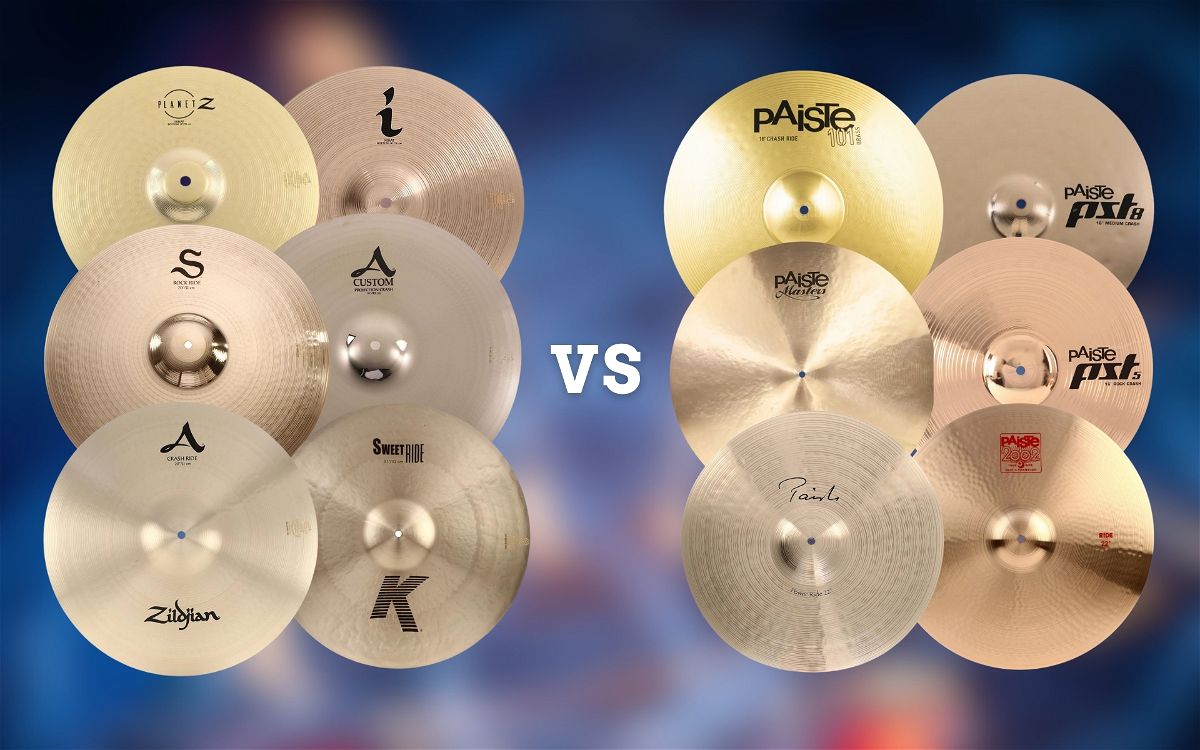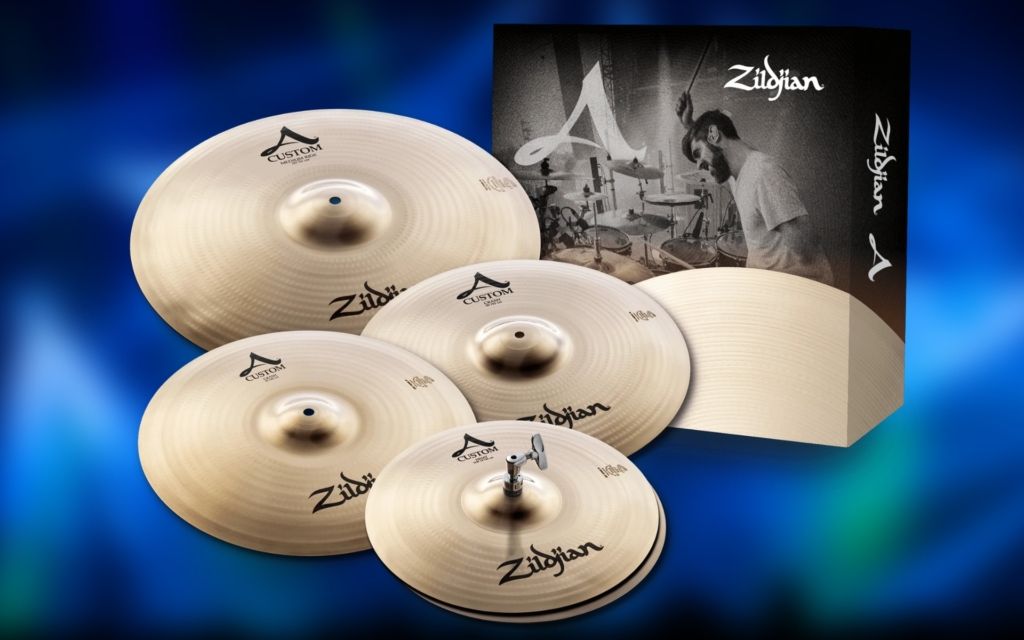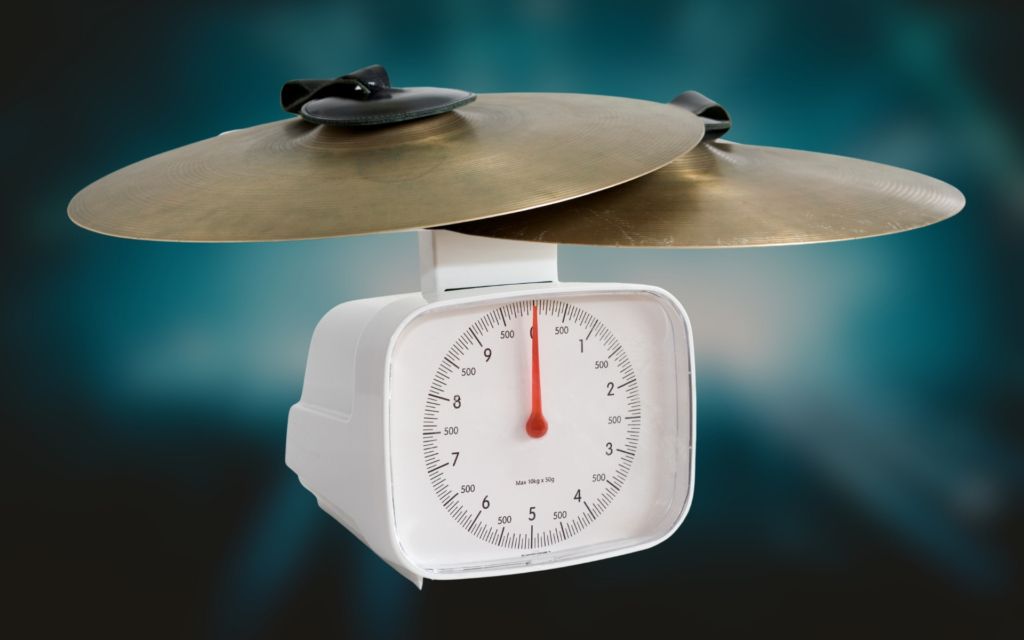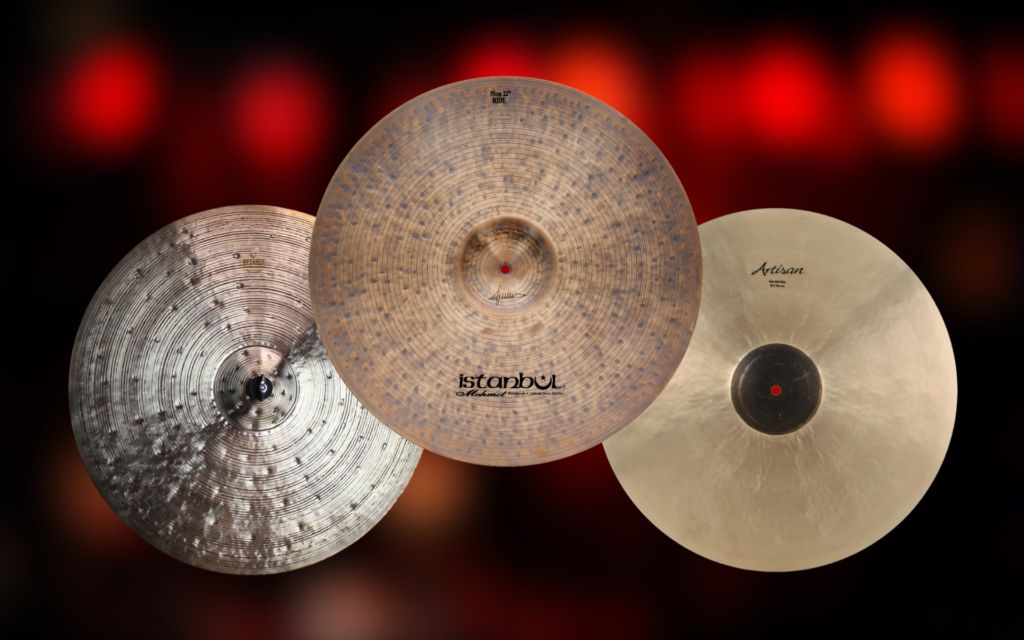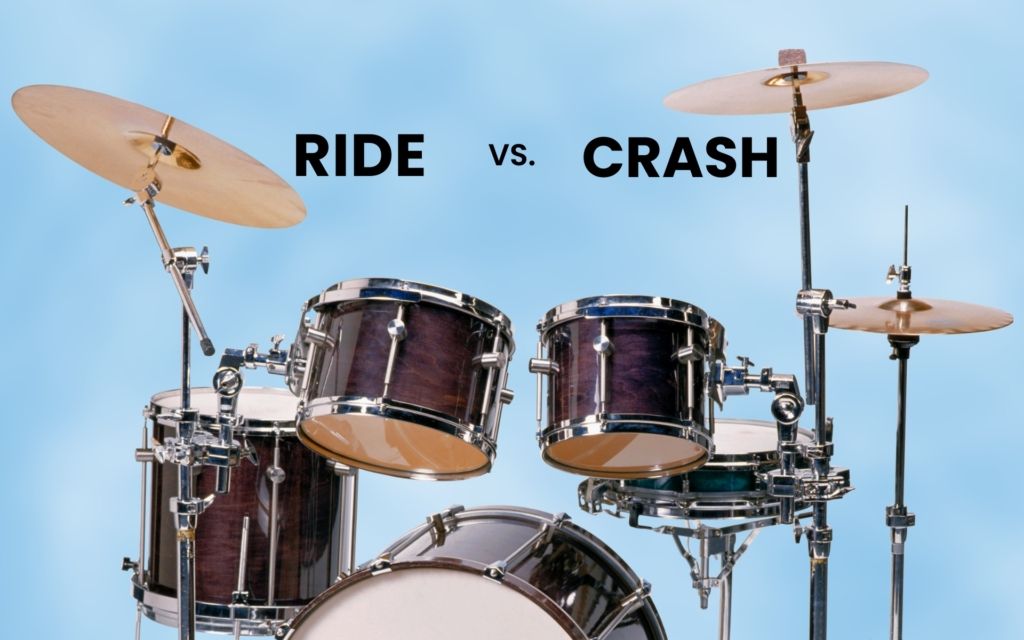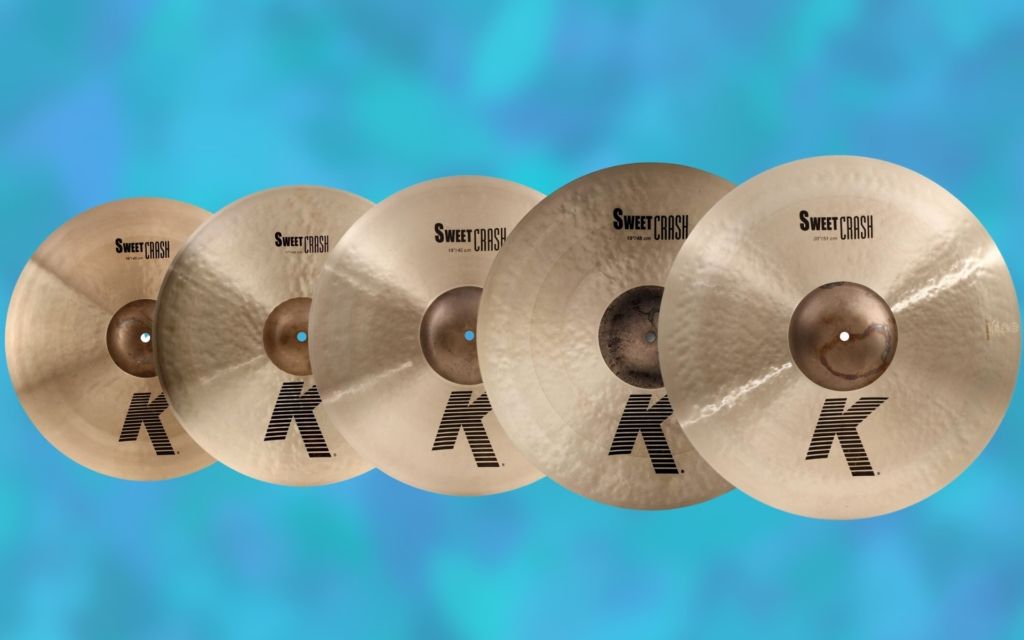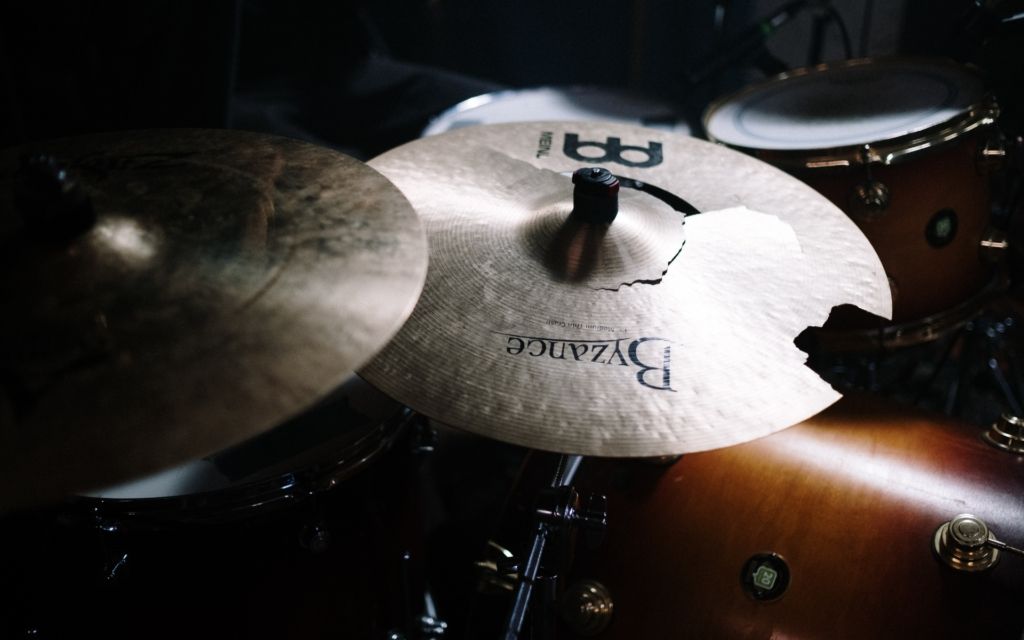Paiste and Zildjian have been two of the biggest names in the cymbal industry for decades. I grew up watching my favorite rock drummers use both brands on live DVDs, with my first set of cymbals being a cheap Zildjian pack.
While looking at the current product line ups of each brand, I can see quite a few similarities. So, I’m going to compare several lines of Paiste and Zildjian cymbals and tell you about the slight differences.
Contents
Zildjian Brand
I absolutely love Zildjian’s history. It’s one of the oldest companies in the world, and they actually recently had their big 400th anniversary in 2023.
Zildjian is arguably the most popular cymbal brand, and it’s because Zildjian cymbals have been around for the longest.
One thing to note about Zildjian is that they use B20 alloys for all of their high-end cymbals. The lower-end options are made from brass, B8, B10, and B12 alloys.
Zildjian also classifies their cymbals under product lines called “families.” You get the I Family, S Family, A Family, and K Family. You’ll find many Zildjian cymbals within each one.
A few big drummers to mention that play Zildjian cymbals are Travis Barker, Dennis Chambers, Larnell Lewis, Mike Mangini, and Steve Smith.
While there are hundreds of cymbals available, I really appreciate how simple Zildjian’s product range is. You get four main lines with a few outliers here and there.
Paiste Brand
Paiste was started in the early 1900s, making the brand over 100 years old. My earliest memory of Paiste cymbals was watching Stewart Copeland play them with The Police.
The big thing that differentiates Paiste from most other brands is that they use unique alloys for their cymbals.
You’ll find a few cymbals made from CuSn20, which is similar to B20. However, plenty of Paiste’s high-end cymbals are made from what we’d typically see as “lower-quality” alloys.
For example, Paiste’s 2002 line is made from CuSn8, which is similar to a B8 alloy that you’d only find on cheaper Zildjian cymbals. This is what many say gives the cymbals that famous Paiste sound.
Paiste’s product range is also a bit more extensive, including several options for beginners and intermediate players, along with plenty of pro picks.
I mostly thought Paiste was a brand for rock drummers, as all the big classic rock drummers used their cymbals. However, you’ll find something for everyone within the brand’s product range.
Entry-Level Cymbals
Entry-level cymbals are designed for beginner drummers who are just getting started. They use affordable materials to keep costs low, allowing newer players to get them for a decent price.
Zildjian and Paiste are both top-tier brands, so they don’t offer too many lines within this range. However, there are two from each brand to mention.
Zildjian Planet Z vs Paiste 101
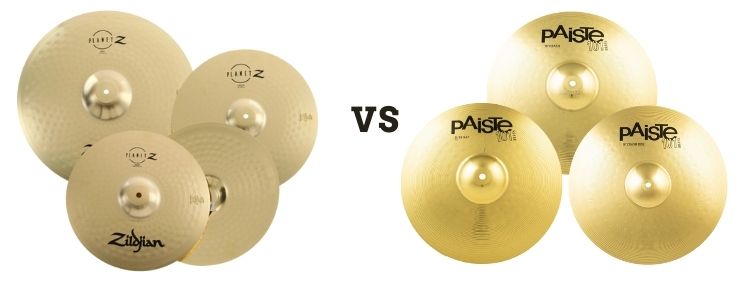
The Zildjian Planet Z cymbals are the most affordable ones you can get from the brand. Most people don’t even know that these are Zildjian cymbals, as I remember previous iterations of them not including the Zildjian logo.
They’re made from brass, so they have a very tin-like sound when you play them. Honestly, they don’t sound very good, but they’re more than perfect for new drummers who just need cymbals for target practice.
The Paiste equivalent of these is the Paiste 101 line. These are also made from brass, and they have a harsh tone that rings quite aggressively.
I personally would say that the Zildjian Planet Zs are the better option here, as they sound slightly more pleasant. Both are decent for beginners, though.
Zildjian I Family vs Paiste PST
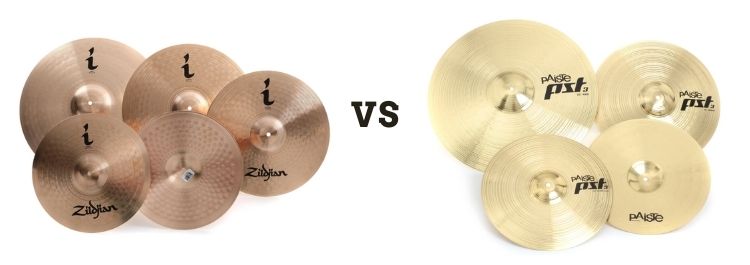
The Zildjian I Series cymbals are a much better option for beginner drummers. These cymbals are made from a B8 alloy, giving them a bit more complexity than the brass Planet Zs.
I used to own a set of Zildjian ZBTs, and these are the updated replacement for those. They’re heavy cymbals with loud and cracking tones, and they’re really well-suited for rock and punk music.
They just don’t have a lot of musical depth. I found that you have to hit them hard to get the full tones.
From Paiste’s side, you get the PST cymbal lines. The cool thing about Paiste is that there are a few, including the PST 3, PST 5, and PST 7 ranges. All of those cymbals are made from a B8 bronze equivalent, but the quality gets better as the number gets higher.
I’d say that the Zildjian I cymbals are far better than the Paiste PST 3 and 5 options, but the Paiste PST 7s are unbeatable in the beginner cymbal range. These are definitely my favorite option for anyone on a tight budget.
Mid-Range Cymbals
Mid-range cymbals have much better sound quality and tonal control than entry-level options. While they don’t sound as good as pro cymbals, you could easily get away with using them at live gigs.
Most cymbal brands don’t offer many mid-range options, with both Paiste and Zildjian following this trend.
Here are the intermediate cymbals from each brand.
Zildjian S Family vs Paiste PST

Zildjian’s S Family includes two different lines of cymbals. You get the standard Zildjian S cymbals and then Zildjian S Dark cymbals. Both options are made from a B12 alloy, making them sound a lot more musical and responsive than all of the cymbals we’ve looked at so far.
The standard S cymbals have a glossy and punchy sound, while the S Dark cymbals sound lower-pitched. They have a low growl which I really enjoy.
Paiste’s comparative cymbal line is the PST 8 line. I find these cymbals to be incredibly underrated. They’re slightly pricier than the popular PST 7 line, so most drummers end up buying pro cymbals with a similar price.
However, if you put a full set of these on your setup, you’re going to get some bright cymbals that have plenty of complex character. I much prefer their tones to the Zildjian S cymbals, but the Zildjian S Dark cymbals definitely offer more variety.
Professional Cymbals
Now let’s move on to the main options from each brand. These are the top lines of cymbals intended to be used for professional settings. These are also expensive cymbals, but they’re well worth their higher price tags.
Zildjian A Family vs Paiste Signature

Zildjian’s A Series cymbals are some of the most famously used cymbals ever. The standard Zildjian A cymbals have been used on thousands of albums over the years, and they’re often the go-to choice for professionals.
Paiste’s comparative cymbals are the Paiste Signatures. Like the Zildjian As, you get dozens of different designs within this line. The shared features are that all the cymbals are loud and cutting.
One thing to note is that Paiste’s Signature Series cymbals are slightly more expensive than Zildjian As.
I can’t say which sounds better here, as it all comes down to personal preference. I’d recommend listening to a bunch of different demos to get an idea of each cymbal line. Both lines include great cymbals!
Paiste also offers the Formula 602s, which are very similar to most Zildjian As. These have a very modern sound and cater well to studio settings.
Zildjian K Family vs Paiste Masters
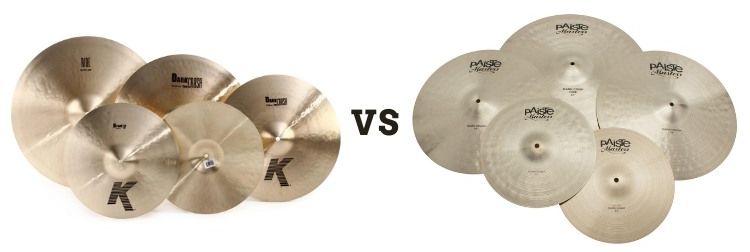
Zildjian’s K cymbals are the brand’s flagship designs. If you want to get some of the best-sounding cymbals on the market, you just have to look within the K Family.
The main options are the Standard Ks, K Customs, and K Constantinoples. Each subsection includes multiple different cymbal designs to produce unique sounds.
With that said, the K Constantinople cymbals are some of the best cymbals I’ve ever heard being played in live and studio settings.
Paiste’s Masters line includes some of the brand’s best and highest-quality cymbals. Many of them share similar qualities to the K Constantinoples, and they’re often used by jazz drummers due to their musical complexity and high-quality tonal response.
Zildjian A Custom vs Paiste 2002
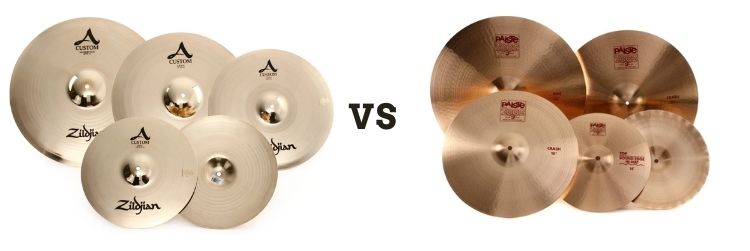
Within Zildjian’s A line, you also get the A Custom cymbals, which are a lot brighter and more aggressive. They’re very loud, making them great options for heavy drummers.
However, I think Paiste definitely wins here, as the brand has the famous Paiste 2002s. These cymbals are big and heavy, and they produce huge sounds to fill a room.
They were famously played by John Bonham, and they’ve since been played by countless rock drummers.
These are a classic example of how Paiste produces high-end cymbals with alloys that are commonly used for lower-end options, as they’re made from CuSn8, which is Paiste’s B8 equivalent.
If you want even louder and heavier cymbals you can look at the Paiste RUDE cymbals.
Conclusion
You can easily find some good cymbals from both cymbal makers. The area where Zildjian clearly wins is reach.
With the brand being so big and popular, it’s quite easy to find whatever Zildjian cymbal you’re looking for, even if you live somewhere obscure. The resale value on Zildjian cymbals is also really good.
Paiste does very well in the beginner and intermediate ranges, as there are far more options to choose from. However, the professional cymbals from the brand are also incredible and more than good enough to compete with all the top Zildjian options!

